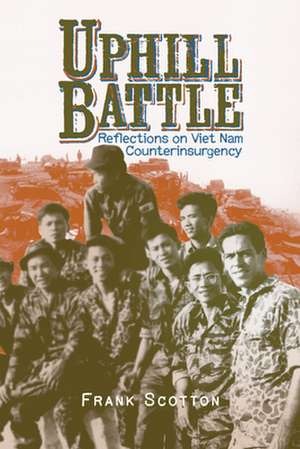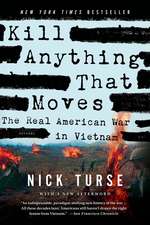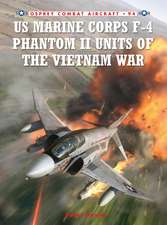Uphill Battle: Reflections on Viet Nam Counterinsurgency: Modern Southeast Asia Series
Autor Frank Scottonen Limba Engleză Paperback – 14 iul 2014
How could the United States lose a war that seemed easy to win?
When the Viet Nam War ended, with the United States of America defeated, many wondered how a military powerhouse lost to a “raggedy-ass, little fourth-rate country,” as President Lyndon Johnson called North Viet Nam. Frank Scotton knew why. A young Foreign Service Officer assigned to Viet Nam in 1962, Scotton drove roads others avoided, walked trails alone, and spent nights in remote hamlets. Learning the Vietnamese language, carrying a carbine, and living out of a rucksack, he proved that small teams, correctly trained and led, could compete with communist units.
In 1964, Scotton organized mobile platoons to emphasize political aspects of the conflict. Those special teams, adopted by the CIA, became models for the national pacification program. He prepared units in some provinces at the request of General Westmoreland, and in 1965 and 1966 worked with Special Forces. While organizational assistant and troubleshooter for Robert Komer in 1967, and subsequently with William Colby in the military headquarters (MACV), Scotton reluctantly concluded that improved counterinsurgency techniques could not beat back the challenges posed by North Viet Nam resolve, lack of political energy in South Viet Nam, and the dissolving American commitment. For the first time Scotton shares his important observations and reasoned conclusions about the United States’s involvement in the Viet Nam War.
When the Viet Nam War ended, with the United States of America defeated, many wondered how a military powerhouse lost to a “raggedy-ass, little fourth-rate country,” as President Lyndon Johnson called North Viet Nam. Frank Scotton knew why. A young Foreign Service Officer assigned to Viet Nam in 1962, Scotton drove roads others avoided, walked trails alone, and spent nights in remote hamlets. Learning the Vietnamese language, carrying a carbine, and living out of a rucksack, he proved that small teams, correctly trained and led, could compete with communist units.
In 1964, Scotton organized mobile platoons to emphasize political aspects of the conflict. Those special teams, adopted by the CIA, became models for the national pacification program. He prepared units in some provinces at the request of General Westmoreland, and in 1965 and 1966 worked with Special Forces. While organizational assistant and troubleshooter for Robert Komer in 1967, and subsequently with William Colby in the military headquarters (MACV), Scotton reluctantly concluded that improved counterinsurgency techniques could not beat back the challenges posed by North Viet Nam resolve, lack of political energy in South Viet Nam, and the dissolving American commitment. For the first time Scotton shares his important observations and reasoned conclusions about the United States’s involvement in the Viet Nam War.
Preț: 238.40 lei
Nou
Puncte Express: 358
Preț estimativ în valută:
45.62€ • 47.85$ • 37.98£
45.62€ • 47.85$ • 37.98£
Carte disponibilă
Livrare economică 11-25 martie
Preluare comenzi: 021 569.72.76
Specificații
ISBN-13: 9780896728677
ISBN-10: 0896728676
Pagini: 490
Dimensiuni: 152 x 229 x 38 mm
Greutate: 0.75 kg
Ediția:1
Editura: Texas Tech University Press
Colecția Texas Tech University Press
Seria Modern Southeast Asia Series
ISBN-10: 0896728676
Pagini: 490
Dimensiuni: 152 x 229 x 38 mm
Greutate: 0.75 kg
Ediția:1
Editura: Texas Tech University Press
Colecția Texas Tech University Press
Seria Modern Southeast Asia Series
Recenzii
A fascinating and historical commentary on the Viet Nam War from 1962 through 1975 as seen through the eyes of one of the key figures in the development and implementation of Viet Nam’s pacification program and CORDS (Civil Operations and Revolutionary Development Support) as well as a very personal account of Scotton’s love affair with Viet Nam and its people.
—Merle Pribbenow, translator, researcher, and retired CIA officer
—Merle Pribbenow, translator, researcher, and retired CIA officer
Notă biografică
From 1962 through 1975, Frank Scotton spent at least part of every year in Viet Nam. He retired in 1998 after serving three years as USIA assistant director for East Asia. He currently lives in Southern California.





















